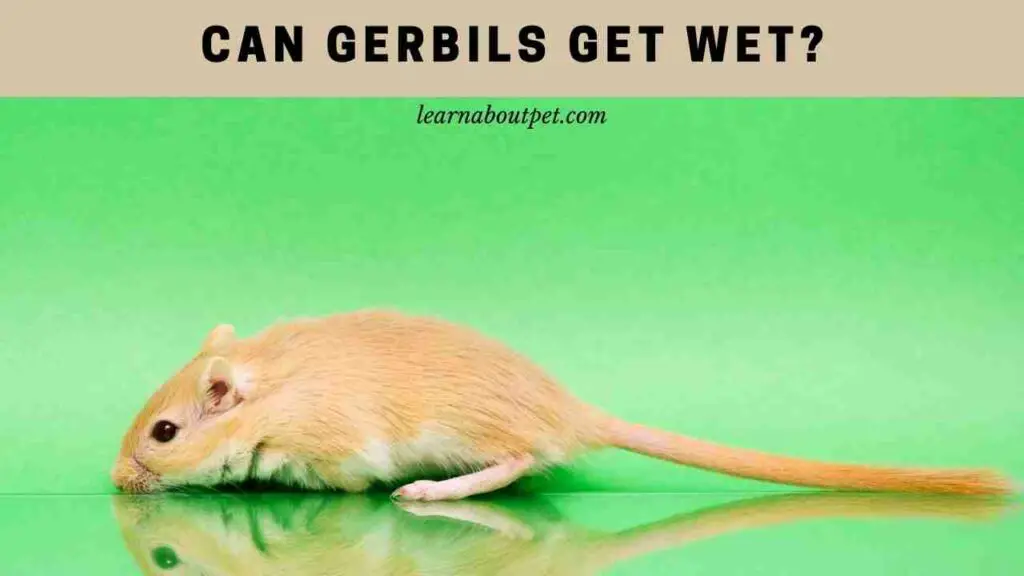Owning a gerbil or more than one gerbil can be a sweet experience. Gerbils are sweet innocent pets in addition to the fact that they are low maintenance. However, gerbils also require your attention as much as any other pet animal but many gerbil owners get confused when it comes to bathing the gerbils.
Can gerbils get wet? No, gerbils can’t get wet. Neither should the gerbil owner try to make the gerbils bathe. Being cute little pets, gerbils require very careful protection from water. Gerbils can also make themselves dirty very easily and more often many owners try to bathe their pets, but it is advisable just to clean gerbil with minimal water.

Gerbils can be a great pet but a lot of questions are unanswered about petting gerbils. In this article, we will try to cover some precautions that gerbil owners must take to ensure that their little friend lives happily.
Do Gerbils Like To Get Wet?
Even though gerbils love playing with toys, unlike dogs gerbils dislike getting wet or swimming. Gerbils don’t like water games like other pets. However, gerbils have the sustainability to outlive most difficult situations and it should be noted that gerbils can swim but only if it is an emergency. Can gerbils die from water?
Putting gerbils in water intentionally or setting up a gerbil’s home near a water body should be avoided. As mentioned above gerbils dislike getting wet so bathing your gerbils or gerbils should also be avoided.
Can Gerbils Get Wet Tail?
Before we tell if Gerbils are prone to wet tail or not we will make you understand what is the wet tail. A wet tail is an ailment that influences the rodents that are kept in cages. Proliferative Ileitis or transmissible ideal hyperplasia is its scientific name. This disorder is caused by stress among rodents. This dangerous issue can even cause deaths.
A wet tail is an infection that relates to bacteria. In this disorder rodents, the tail gets wet. It causes loose stool or diarrhea. Gerbils cannot get wet tails because gerbils aren’t rodents and they are affected by different bacteria than hamsters or rabbits.
However, This also doesn’t conclude that gerbils are not prone to severe diarrhea. Stress can cause diarrhea among gerbils.
What Causes Wet Tail In Gerbils?
Wet tail is a condition that is related to stress in rodents. When rodents get very stressed their gut bacteria start to increase, that bacteria further causes diarrhea among these little creatures.
Furthermore, diarrhea causes the back and tail of the rodent to get wet which further causes infectious wounds. Though wet tail among gerbils is different from the wet tail condition of rabbits or other rodents, the cause of wet tail is the same as stress.
In addition, it should be noted that wet tail condition is transmissible among rodents. If one rodent has got wet it can be transmitted among others in the cage. However, this disorder is transmitted only if the other gerbil is also stressed.
Factors Adding To Stress Among Gerbils
Many factors can add stress to a gerbil’s life. We list down the factors including environmental and handling factors. The following tips are necessary to bring in a healthy and stable gerbil without causing stress.
- Frequently changing the environment of gerbils can cause them stress. It should be noted that gerbils should be given a proper and stable place to live. Moving gerbils from one place to another frequently is something that should be avoided.
- Though picking up and cuddling the gerbils is something every pet owner likes to do, it should be noted that some gerbils don’t like being held. Picking gerbils who don’t like being held can cause stress among them. You may notice disapproving signs from them. Signs like distancing themselves from you or their rigidness when you hold them are signs of disapproval.
- When you put your gerbil somewhere where there is frequent loud noises it can also cause stress in your gerbils. Another environmental factor is putting your gerbils somewhere where there is too bright light.
- Another factor that can cause stress among gerbils is If you hold your gerbil and move them around too quickly as we do it to our babies. Gerbils are very vulnerable and this practice is very stressful for them so it should also be avoided.
Can Gerbils Get Wet?
To answer, can gerbils get wet? Yes, gerbils Can get wet. But getting Gerbils wet intentionally should be avoided as this is also a factor that causes stress among gerbils and further leads to health problems. So the answer is no, gerbils shouldn’t be kept in water. Being so small gerbils are very vulnerable to getting hypothermic.
If gerbils do get wet, the owner should dry them as soon as possible and keep them warm by putting them in a warm room or blanket. Gerbils should not be given a water bath unless it becomes too necessary for them.

Gerbils don’t play games in water like other animals, although they can swim in an emergency. However, it’s recommended that the gerbil owner should give their gerbil a sand bath rather than a water bath. Gerbils bathe in dust in the wild.
Why Can’t Gerbils Get Wet?
Gerbils should be avoided by giving water baths because it causes stress in them and it can lead to diarrhoea or hypothermia. This is the reason that gerbil owners should avoid putting their gerbil pets in the water.
Do Gerbils Get Wet Tail?
Wet-tail is an infection in rodents that are kept in cages, primarily hamsters, but can include gerbils, rabbits and rats. It is mainly caused by stress factors among rodents. Sometimes even treatment can’t help them to survive.
Can Gerbil Swim?
Yes, gerbils can swim as they are naturally born to survive harsh conditions, but that doesn’t mean the owner should make them swim. It is harmful to gerbils to even get wet. So making gerbils swim should also be avoided at any cost. The gerbil owners should note that even if there are many videos on YouTube showing gerbils swimming, that is nothing less than being cruel to your pet.
Gerbils clean themselves with sand baths. The gerbil owners should arrange some sand in a small bowl and they will enjoy it. Furthermore, when bathing in sand, gerbils should be left alone. Gerbils do their self grooming in sand very efficiently.
What Happens If You Put A Gerbil In Water?
Putting gerbils in water will only cause trouble in the lives of gerbils and create stress in them. Your gerbil would rather like to stay in a dry place that is not very bright and far from frequent loud noises. If the owners put gerbils in water that is deep, Gerbils get at risk of getting drowned.
Gerbils don’t need water except for drinking. A small bowl of fresh water should be kept beside gerbils.
Final Verdict – Can Gerbils Get Wet
Having a gerbil as a pet is a great experience but owners should understand that they shouldn’t clean their gerbil pet with water. Sand baths are preferred. Water can cause stress among other external factors mentioned above. The stress among Gerbils leads to high-risk disorders that can lead to the death of gerbils. Can gerbils get wet? Yes, they can but it should be avoided.

The gerbil owners should not watch nor promote the videos that show gerbils swimming. It is cruel and causes stress among gerbils. If required urgently to clean gerbil by water, gerbil owners should gently clean the gerbil with water with extreme care.
As a pet lover, make sure to learn about pet more and give your pet gerbil a good and comfortable life!

Welcome to Learn About Pet. My name is Rajkumar Ravichandran and I love all pets, travel, and amazing food. I write about my passion and personal experience caring for multiple pets in this blog! ❤️
Post Disclaimer
DISCLAIMER: THIS BLOG OR WEBSITE, "Learn About Pet", DOES NOT PROVIDE YOU WITH MEDICAL ADVICE AND IS NOT A SUBSTITUTE FOR MEDICAL ADVICE. ALWAYS GET IN TOUCH WITH YOUR PERSONAL VETERINARIAN AND USE INFORMATION HERE AS GENERAL ADVICE.
The information, including but not limited to, text, graphics, images and other material contained on this website are for informational purposes only. No material on this site is intended to be a substitute for professional veterinary advice, food recommendation, diagnosis, or treatment. Always seek the advice of your veterinarian or other qualified health care provider with any questions you may have regarding a medical condition or for pet food related questions.







